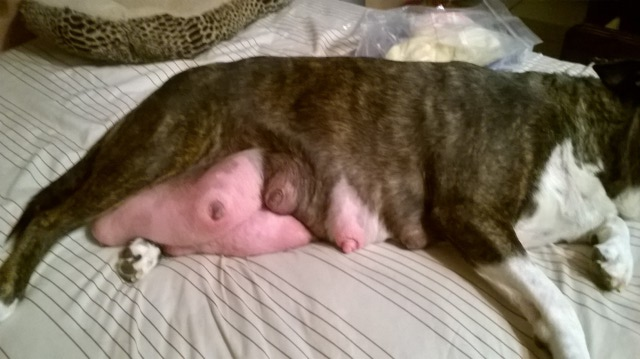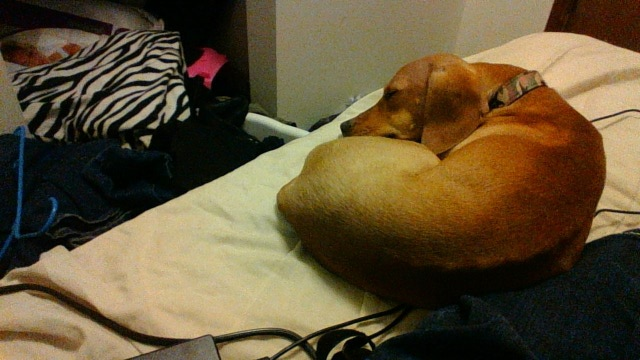QuestionHi Patti- Max, a toy poodle,had a bronchoscope about three weeks ago. his
symptoms and X-rays indicated this was necessary to give a diagnosis. After
all is said and done, it seems like there are no answers still. he went in with a
hacking/ what i call an asthmatic kind of cough/while breathing...like he
couldn't catch his breath.
the doctors said he had a very slight trachea collapse and his right bronchial
had something going on, and therefore he probably has chronic bronchitis.
he is now having these incredibly intense sneezing jiggs..on one occasion he
hit his head on the floor..so now the vet is saying he thinks it's kennel cough
from when he was there and wants to get him on some antibiotics (without
seeing him). I am pretty sure , sneezing is not a symptom of this. What do
you think i should do?
AnswerHi Cheri,
The usual symptoms of Kennel Cough include a dry, "non-productive" cough. The dog sounds as if there is something stuck or caught in the throat and the coughing is an unsuccessful attempt to dislodge the object. A coughing jag is sometimes followed by retching. Sometimes the coughing/gagging seems very violent. A watery nasal discharge is sometimes present. The episodes of coughing may go on for minutes at a time and then be repeated at intervals.
If Max is doing a lot of sneezing, it's more probable he has an upper respiratory infection, this are like a human cold or sinus problem. Upper respiratory tract infections are highly infectious and are passed by sneezes from other sick dogs or from dogs that silently carry the infection, so it's possible Max caught this during his recent hospital stay.
Antibiotics are used to treat upper respiratory infections, so maybe your vet just mis-spoke when he told you Max had Kennel Cough. Of course, if you'd feel better hearing this from your vet, you should contact him or her.
It seems reasonable to treat your dog with antibiotics, otherwise this could develop into something more serious, such as pneumonia.
Besides treating Max for the sneezing and his chronic bronchitis, he might benefit from nutritional supplements to boost his immune system, since he's susceptible to illness.
Giving Max a daily "dose" of an Omega 3 Fatty acid supplement can help fortify his immune system. There are numerous brands of fatty acid supplements with different quantities of vitamins and minerals. Brands to consider are: Drs. Foster and Smith Vitacaps, Derm Caps, and 3V Caps.
Flax seed oil, pumpkin seed oil, soybean oil, and marine fish oils are also high in Omega 3 Fatty acids. Try starting with 1/4 a teaspoon of one of these oils (on his food once per day) and increase to 1/2 teaspoon if it's well tolerated.
Since fatty acids are polyunsaturated fats (the so-called "good fats"), they do add calories. If you decide to give this to Max, a lower calorie dog food, or fewer treats may necessary to prevent weight gain. Some pets may develop diarrhea from fatty acid supplements. Often, starting supplementation at a low dose and gradually working up to the therapeutic dose can help alleviate this problem. It has also been suggested that diets low in fat may increase the effectiveness of fatty acid supplements.
Studies comparing different populations of people have shown that increasing fruit and vegetable (and therefore, antioxidant) consumption may reduce the risk of developing chronic bronchitis. Giving Max fresh fruits and vegetables is an easy way of increasing his antioxidant in-take. Read more about this here:
http://www.mochara.ie/ingredients/fruit_vegetables.php
When adding fresh fruits and veggies to a dog's diet, go slow. Too much of these good things can cause an upset stomach, or diarrhea. It's better to start with an apple wedge or baby carrot or two and see how Max tolerates it, before increasing the amount you give.
Alternatively, you could also use an antioxidant supplement. This should contain Vitamins A,C,and E, B-Carotene, and Selenium. Get a dose recommendation from your vet, as over supplementing vitamins can cause health problems in dogs.
It would help Max's bronchitis if you could remove environmental contaminants as much as possible, especially if you smoke and or live in an area with low humidity. If it is not possible to avoid a low humidity environment in the winter, consider using a humidifier or a vaporizer in the area where Max spends a lot of time, to help his breathing.
I hope I've been a help.
Best of luck,
Patti

 Engorged Breasts
Question
mamma
My Friends Dog Had A Litter About
Engorged Breasts
Question
mamma
My Friends Dog Had A Litter About
 Identifying the breed
Question
Unknown Dog
Greetings Patti, I would li
Identifying the breed
Question
Unknown Dog
Greetings Patti, I would li
 Mastitis
QuestionQUESTION: Good morning Karen.
My Pomeranian is
Mastitis
QuestionQUESTION: Good morning Karen.
My Pomeranian is
 maltese with brown ears
Question
maltese
we bought a dog and owner said its pur
maltese with brown ears
Question
maltese
we bought a dog and owner said its pur
 2 Year Old Dachshund Rescued From Probable Bad Situation
Question
Nelson Nelson
Hi there! I recentl
2 Year Old Dachshund Rescued From Probable Bad Situation
Question
Nelson Nelson
Hi there! I recentl